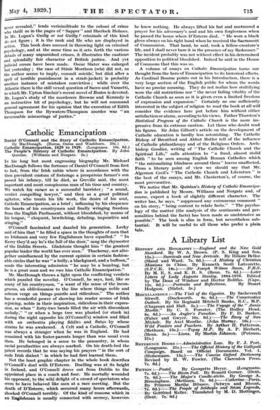Rogues and Worse
The Mysterious Baronne de Feucheres. By Louis Andre. (Hutchinson. 12s. 6d.)
-Detective and Secret Service Days. By E. T. Woodhall.
Tax collective price of the five volumes detailed above is .24 Is. 13d7 and, if it is true that a fool and his money are soon parted, the publishers must be firm believers in the ubiquity and numbers of the slightly unwise public to whom they seemingly appeal. But the purchaser of most, at alt events, of these works is not going to get very much for his money, for in bulk they are distressingly dull. Scandalous, of course—there is no end to the scandal that can be written round eighteenth century royalty for instance. But surely the most voracious devourer of scandal and homicide and sordid intrigue will be surfeited when he is confronted with "Curious Trials," which run from that of Socrates to the gentle- man who, was arraigned for violating the anti-evolution statute of Tennessee, with a dull legal analysis of a case that can never be settled, and—as ,a glorious culmination—with Sinners Down the Centuries, who range from Cleopatra (oddly enough associated by the author with Marcus Antoninus) to Cora Pearl, and from Ovid to Edmund Kean (not surely a sinner of the first rank), and who move in "a world (forts. nately or unfortunately) innocent of Herr Freud or Herr Jung."
Apart from the " dramatic " (that is, flashy) tone, of most of these books and apart from their errors of fact which are myriad, what strikes one forcibly about so much of this inferior 'Writing is its cheap vulgarity. In Sinners Down the Centuries Abelard is styled "a cad and 'a prig," and in Curious Trials Socrates is described as "the great debunker of his times," and therefore one is not in the leost `surprised to find the latter book containing chapter-heariings like " Cupid in Court," "Chastity Preserved," and another, which seems by this time to be growing a little .grey in the whisker—" The Eternal Triangle." If it is .. suggested 'in justification of all this spate of third-rate printed maga that it is a contribution to the study of criminal psycholody, the reply is that serious criminologists go to the original records and not to cheap rechauffes of them.
How dull such rechauffes may be is exemplified in the late M. Andre's The Mysterious Baronne. The Baronne was not a mystery at all. She was Sophie Dawes, the well-known English courtesan, who acquired the Due de Bourbon (amongst many others) for a lover. The Duke was found in 1830 hanging by the neck dead, and it became a question whether his end was murder or suicide. Despite the author's 256 laborious pages of legal analysis and his "conclusive revelations," it is .still a question. Mr. Barry m Sinners Down the Centuries specializes in erotic adventure, can write (p. 110) "the data is taken " and "a form of parasiticism" (p. 280), and when he quotes from a language not his own hardly ever does so without making a mistake in it. Mr. Bierstadt in Curious Trials slays again the slain by recounting (inter alia) the fifty times told stories of the murder of Thyme of Longleat and the trials of Lord Mohun, George Wished, and Socrates ; but, as he writes from New York, it is possible that these ancient tales have not yet reached so far. However we do owe him gratitude for retelling the famous story of how in 1925 the State of Tennessee championed the legend of Adam and Eve and gave Mr. W. J. Bryan the opportunity of declaring that he "absolutely and unequivocally refused to be a mammal."
Out of all this welter of pseudo-sensation, inaccurate history, and mediocre writing it is refreshing to be able to single out two books which are honest of purpose and straightforwardly written. Mk. Woodhall, both as a regular deteaiire, in the military secret service and through private detective work, has enjoyed a varied experience, which has enabled him to produce in Detective Days a well-written and genuinely exciting book of, first-hand knowledge. -It is consoling to hear hhn say that "crime is the most uoremunerative profession in the world," and his further opinion that in the criminal under- world there exist certain master- n-ilhdS "whose identity' is Dever revealed," lends verisimilitude to the colossi of crime Who thrill us in the pages of `-` Sapper" and Sherlock Holmes. In Mr. Logan's Guilty or not Guilty P• criminals of this kind do not figure ; it is the rank and file whO are displayed in action. This book does succeed in throwing light on criminal psychology, and at the same time as: it, sets forth the various details of many unpunished crimes, it illustrates the cautious and splendidly fair character of British justice. And - yet judicial errors have been made. Oscar Slater was enlarged but yesterday ; the ease of Stink Morrison (who did not, as the author seems to imply, commit suicide; but died after a spell of terrible punishment in a strait-jacket) is probably another. instance of mistaken conviction ; while over the Atlantic there is the still vexed question of Sacco and Vanzetti, to which Mr. Upton Sinclair's recent novel of Boston is-devoted. Mr. Logan's study of the murderers Browne' and KennedY is an instructive bit of psychology, but he will not command general agreement for: his opinion that the execution of Edith .Thompson for the Bywaters-Thompkon 'murder was " an inexcusable Miscarriage of justice."























































 Previous page
Previous page